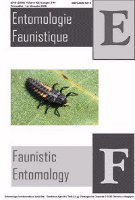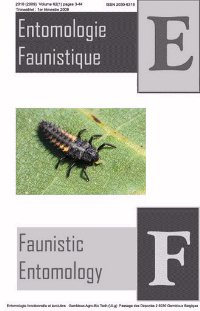- Accueil
- Volume 68 (2015)
- Etude des Macroinvertébrés (Gastéropodes, Diptères et Odonates) des marais de Smir-Restinga (Nord-Ouest du Maroc)
Visualisation(s): 1342 (31 ULiège)
Téléchargement(s): 3849 (61 ULiège)
Etude des Macroinvertébrés (Gastéropodes, Diptères et Odonates) des marais de Smir-Restinga (Nord-Ouest du Maroc)

Résumé
La présente étude traite la biologie et l’écologie des Macroinvertébrés aquatiques (Odonates, Gastéropodes et Diptères) des marais de Smir-Restinga. Elle a mis en évidence une richesse taxonomique qualitative et quantitative importante de ces derniers.
Des échantillonnages saisonniers au niveau de huit stations étalées sur l’ensemble du site, ont donné un total de vingt familles de Macroinvertébrés constituées de six familles de Gastéropodes avec sept genres, quatre familles d’Odonates reparties sur six genres et dix familles de Diptères représentant dix sept genres. Plusieurs genres et espèces inventoriés sont nouvellement cités au niveau des marais de Smir et deux espèces sont d’un grand intérêt pour la santé publique. Il s’agit d’Anopheles labranchiae (Falleroni 1926) (Diptera: Culicidae) et Lymnae truncatula (Müller 1774) (Gastéropodes: Lymnaeidae).
Cette diversité apparaît étroitement liée au régime hydrique temporaire des stations.
Toutefois, l’impact humain sur l’ensemble des marais rend tout ce patrimoine marocain nord africain et méditerranéen, en voie de disparition. Ce dernier exige ainsi une conservation urgente.
Abstract
The present study treats the biological and ecological aspects of the Macroinvertebrates watery (Odonates, Gastropods and Dipterous) of the marshes of Smir-Restinga; it highlights the important qualitative and quantitative taxonomic richness of the latter.
Seasonal samplings on the level of eight stations spread out over the whole site, gave a total of twenty families of Macroinvertebrates consisted of six families of Gastropods with seven kinds, four families of Odonates left again on six kinds and ten families of Dipterousrepresenting more than ten seven kinds.
Several genus and species inventoried are newly listed at marsh Smir and two species are of a great interest for the public health: Anopheles labranchiae (Falleroni 1926) (Diptera: Culicidae) and Lymnae truncatula (Müller 1774) (Gastéropodes: Lymnaeidae).
This diversity appears closely related to the temporary hydrous mode of the stations. However, the human impact on the whole of the marshes makes all this inheritance Moroccan, northern African and Mediterranean in the process of disappearance. The latter requires an urgent conservation thus.






